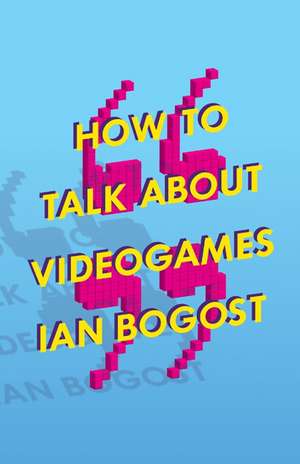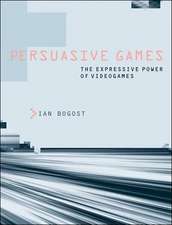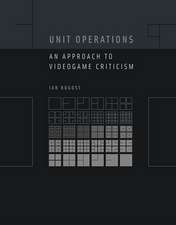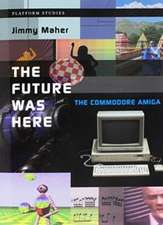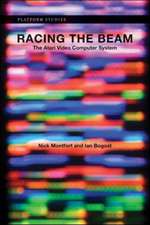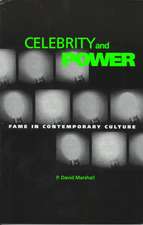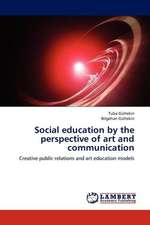How to Talk about Videogames: Electronic Mediations, cartea 47
Autor Ian Bogosten Limba Engleză Paperback – 15 noi 2015
Videogames! Aren’t they the medium of the twenty-first century? The new cinema? The apotheosis of art and entertainment, the realization of Wagnerian gesamtkunstwerk? The final victory of interaction over passivity? No, probably not. Games are part art and part appliance, part tableau and part toaster. In How to Talk about Videogames, leading critic Ian Bogost explores this paradox more thoroughly than any other author to date.
Delving into popular, familiar games like Flappy Bird, Mirror’s Edge, Mario Kart, Scribblenauts, Ms. Pac-Man, FarmVille, Candy Crush Saga, Bully, Medal of Honor, Madden NFL, and more, Bogost posits that videogames are as much like appliances as they are like art and media. We don’t watch or read games like we do films and novels and paintings, nor do we perform them like we might dance or play football or Frisbee. Rather, we do something in-between with games. Games are devices we operate, so game critique is both serious cultural currency and self-parody. It is about figuring out what it means that a game works the way it does and then treating the way it works as if it were reasonable, when we know it isn’t.
Noting that the term games criticism once struck him as preposterous, Bogost observes that the idea, taken too seriously, risks balkanizing games writing from the rest of culture, severing it from the “rivers and fields” that sustain it. As essential as it is, he calls for its pursuit to unfold in this spirit: “God save us from a future of games critics, gnawing on scraps like the zombies that fester in our objects of study.”
Delving into popular, familiar games like Flappy Bird, Mirror’s Edge, Mario Kart, Scribblenauts, Ms. Pac-Man, FarmVille, Candy Crush Saga, Bully, Medal of Honor, Madden NFL, and more, Bogost posits that videogames are as much like appliances as they are like art and media. We don’t watch or read games like we do films and novels and paintings, nor do we perform them like we might dance or play football or Frisbee. Rather, we do something in-between with games. Games are devices we operate, so game critique is both serious cultural currency and self-parody. It is about figuring out what it means that a game works the way it does and then treating the way it works as if it were reasonable, when we know it isn’t.
Noting that the term games criticism once struck him as preposterous, Bogost observes that the idea, taken too seriously, risks balkanizing games writing from the rest of culture, severing it from the “rivers and fields” that sustain it. As essential as it is, he calls for its pursuit to unfold in this spirit: “God save us from a future of games critics, gnawing on scraps like the zombies that fester in our objects of study.”
Din seria Electronic Mediations
-
 Preț: 170.61 lei
Preț: 170.61 lei -
 Preț: 123.92 lei
Preț: 123.92 lei -
 Preț: 154.56 lei
Preț: 154.56 lei -
 Preț: 154.40 lei
Preț: 154.40 lei - 20%
 Preț: 105.75 lei
Preț: 105.75 lei -
 Preț: 112.18 lei
Preț: 112.18 lei -
 Preț: 170.32 lei
Preț: 170.32 lei -
 Preț: 145.17 lei
Preț: 145.17 lei -
 Preț: 154.56 lei
Preț: 154.56 lei -
 Preț: 178.87 lei
Preț: 178.87 lei -
 Preț: 169.34 lei
Preț: 169.34 lei -
 Preț: 252.57 lei
Preț: 252.57 lei -
 Preț: 169.70 lei
Preț: 169.70 lei -
 Preț: 177.27 lei
Preț: 177.27 lei -
 Preț: 177.59 lei
Preț: 177.59 lei -
 Preț: 229.55 lei
Preț: 229.55 lei -
 Preț: 215.61 lei
Preț: 215.61 lei -
 Preț: 198.93 lei
Preț: 198.93 lei -
 Preț: 189.22 lei
Preț: 189.22 lei -
 Preț: 219.88 lei
Preț: 219.88 lei - 20%
 Preț: 180.95 lei
Preț: 180.95 lei - 20%
 Preț: 189.45 lei
Preț: 189.45 lei -
 Preț: 225.87 lei
Preț: 225.87 lei -
 Preț: 227.01 lei
Preț: 227.01 lei - 20%
 Preț: 154.67 lei
Preț: 154.67 lei -
 Preț: 228.38 lei
Preț: 228.38 lei -
 Preț: 178.15 lei
Preț: 178.15 lei -
 Preț: 215.09 lei
Preț: 215.09 lei -
 Preț: 200.29 lei
Preț: 200.29 lei -
 Preț: 185.05 lei
Preț: 185.05 lei - 26%
 Preț: 126.79 lei
Preț: 126.79 lei -
 Preț: 235.10 lei
Preț: 235.10 lei - 27%
 Preț: 103.40 lei
Preț: 103.40 lei - 14%
 Preț: 93.61 lei
Preț: 93.61 lei - 7%
 Preț: 116.61 lei
Preț: 116.61 lei - 33%
 Preț: 113.93 lei
Preț: 113.93 lei - 26%
 Preț: 115.52 lei
Preț: 115.52 lei - 18%
 Preț: 153.44 lei
Preț: 153.44 lei - 25%
 Preț: 126.61 lei
Preț: 126.61 lei - 19%
 Preț: 138.45 lei
Preț: 138.45 lei -
 Preț: 211.67 lei
Preț: 211.67 lei - 13%
 Preț: 141.58 lei
Preț: 141.58 lei - 17%
 Preț: 155.94 lei
Preț: 155.94 lei - 32%
 Preț: 497.85 lei
Preț: 497.85 lei - 9%
 Preț: 663.12 lei
Preț: 663.12 lei - 20%
 Preț: 724.27 lei
Preț: 724.27 lei
Preț: 131.49 lei
Nou
Puncte Express: 197
Preț estimativ în valută:
25.17€ • 26.17$ • 21.09£
25.17€ • 26.17$ • 21.09£
Carte disponibilă
Livrare economică 20 februarie-06 martie
Livrare express 06-12 februarie pentru 20.45 lei
Preluare comenzi: 021 569.72.76
Specificații
ISBN-13: 9780816699124
ISBN-10: 0816699127
Pagini: 208
Dimensiuni: 140 x 216 x 15 mm
Greutate: 0.25 kg
Ediția:1
Editura: University of Minnesota Press
Colecția Univ Of Minnesota Press
Seria Electronic Mediations
ISBN-10: 0816699127
Pagini: 208
Dimensiuni: 140 x 216 x 15 mm
Greutate: 0.25 kg
Ediția:1
Editura: University of Minnesota Press
Colecția Univ Of Minnesota Press
Seria Electronic Mediations
Notă biografică
Ian Bogost is Ivan Allen College Distinguished Chair in Media Studies and professor of interactive computing at the Georgia Institute of Technology. He is the author of many books, including How to Do Things with Videogames and Alien Phenomenology: Or, What It's Like to Be a Thing (both Minnesota), as well as Unit Operations: An Approach to Videogame Criticism and Persuasive Games: The Expressive Power of Videogames. He is the award-winning game designer of A Slow Year, Cow Clicker, and more.
Cuprins
Contents
Introduction. Nobody Asked for a Toaster Critic: Doing Videogame Criticism
1. The Squalid Grace of Flappy Bird
2. A Portrait of the Artist as a Game Studio: Flow, Flower, Journey
3. A Way of Looking: Mirror's Edge
4. The Blue Shell is Everything that’s Wrong with America: Mario Kart
5. Little Black Sambo, I’m Going to Eat You Up!: Scribblenauts
6. Can a Gobbler Have it All?: Ms. Pac-Man
7. Racketeer Sports: Farmville, Candy Crush Saga, and Free to Play
8. The Haute Couture of Videogames: Hundreds
9. Can the Other Come Out and Play?: Between and Way
10. Free Speech is not a Marketing Plan: Bully and Medal of Honor
11. Shaking the Holocaust Train: Manhunt, Train, and Gestural Control
12. The Long Shot: Heavy Rain
13. Puzzling the Sublime: Orbital & Drop7
14. Work is the Best Place to Goof Off: Flight Simulator, Euro Truck Simulator, and the New Simulation
15. A Trio of Artisanal Reviews: Proteus
16. What is a Sports Videogame?: FIFA, Madden, and More
17. The Agony of Mastery: Swing Copters
18. The Abyss Between the Human and the Alpine: Mountain
19. Word Games Last Forever: Words with Friends
20. Perpetual Adolescence: Gone Home
Conclusion. Anything But Games: Not Doing Game Criticism
Notes
Introduction. Nobody Asked for a Toaster Critic: Doing Videogame Criticism
1. The Squalid Grace of Flappy Bird
2. A Portrait of the Artist as a Game Studio: Flow, Flower, Journey
3. A Way of Looking: Mirror's Edge
4. The Blue Shell is Everything that’s Wrong with America: Mario Kart
5. Little Black Sambo, I’m Going to Eat You Up!: Scribblenauts
6. Can a Gobbler Have it All?: Ms. Pac-Man
7. Racketeer Sports: Farmville, Candy Crush Saga, and Free to Play
8. The Haute Couture of Videogames: Hundreds
9. Can the Other Come Out and Play?: Between and Way
10. Free Speech is not a Marketing Plan: Bully and Medal of Honor
11. Shaking the Holocaust Train: Manhunt, Train, and Gestural Control
12. The Long Shot: Heavy Rain
13. Puzzling the Sublime: Orbital & Drop7
14. Work is the Best Place to Goof Off: Flight Simulator, Euro Truck Simulator, and the New Simulation
15. A Trio of Artisanal Reviews: Proteus
16. What is a Sports Videogame?: FIFA, Madden, and More
17. The Agony of Mastery: Swing Copters
18. The Abyss Between the Human and the Alpine: Mountain
19. Word Games Last Forever: Words with Friends
20. Perpetual Adolescence: Gone Home
Conclusion. Anything But Games: Not Doing Game Criticism
Notes
Recenzii
"This is Ian Bogost at his best. Keen intelligence, acid wit, and a restless desire to look beyond the surface and tease out games’ less obvious, more important meanings."—Frank Lantz, director, NYU Game Center
"No one else is as wide-ranging, funny, or inspiringly immune to cant or groupthink as Ian Bogost. How to Talk about Videogames is his most accessible and entertaining book yet."—Tom Bissell, author of Extra Lives and Apostle*
"Ian Bogost can take apart a game’s design and tell you exactly what makes it work and what it means to us personally and to our game-playing society. How to Talk about Videogames has deep insights into a range of current topics we are dealing with or experiencing today. There’s a lot here to learn."—John Romero, veteran game creator
"No one else is as wide-ranging, funny, or inspiringly immune to cant or groupthink as Ian Bogost. How to Talk about Videogames is his most accessible and entertaining book yet."—Tom Bissell, author of Extra Lives and Apostle*
"Ian Bogost can take apart a game’s design and tell you exactly what makes it work and what it means to us personally and to our game-playing society. How to Talk about Videogames has deep insights into a range of current topics we are dealing with or experiencing today. There’s a lot here to learn."—John Romero, veteran game creator
"If you want an engaging, enjoyable tour of the video game commentary in 2015 conducted by a smart and entertaining writer, you’d be hard-pressed to do much better than How to Talk about Videogames by Ian Bogost. "—Boston Globe
"Whether Bogost is examining old favorites like Ms. Pac-Man or scrutinizing a flash-in-the-pan app like Flappy Bird, his outlook is thoughtful, inquisitive, and amused."—Game On
"Bogost embraces the preposterousness and paradox of games as both consumer products and art, and in running with that tension he offers a compelling method of understanding and writing about them."—Gamechurch.com
"[How to Talk about Videogames] has already proven indispensable to those of us interested in how video games have become such a vital artistic medium."—Electronic Literature
"Ian Bogost’s How to Talk About Videogames isn’t just a book about games—it’s a book about criticism, and where it fits in our wider culture. Bogost is the rare academic writer whose work is as clear and exciting as the best of the mainstream, and whose critical exercises backfire by becoming enormous commercial/popular successes."—Boing Boing
"Whether Bogost is examining old favorites like Ms. Pac-Man or scrutinizing a flash-in-the-pan app like Flappy Bird, his outlook is thoughtful, inquisitive, and amused."—Game On
"Bogost embraces the preposterousness and paradox of games as both consumer products and art, and in running with that tension he offers a compelling method of understanding and writing about them."—Gamechurch.com
"[How to Talk about Videogames] has already proven indispensable to those of us interested in how video games have become such a vital artistic medium."—Electronic Literature
"Ian Bogost’s How to Talk About Videogames isn’t just a book about games—it’s a book about criticism, and where it fits in our wider culture. Bogost is the rare academic writer whose work is as clear and exciting as the best of the mainstream, and whose critical exercises backfire by becoming enormous commercial/popular successes."—Boing Boing
